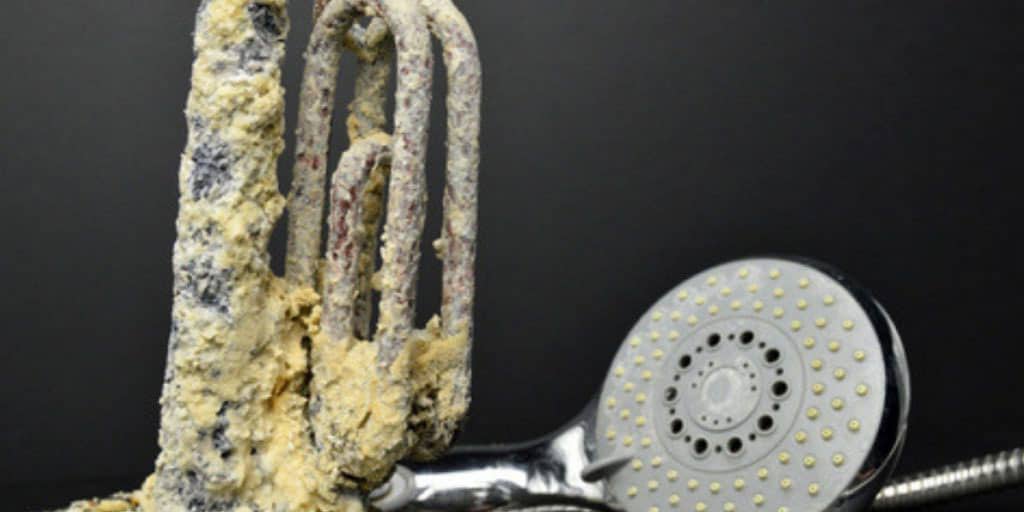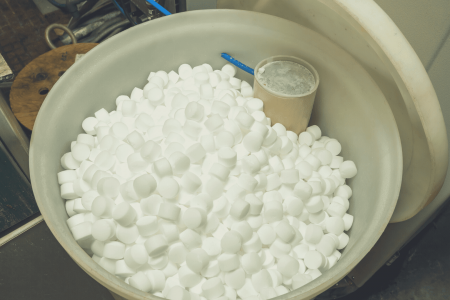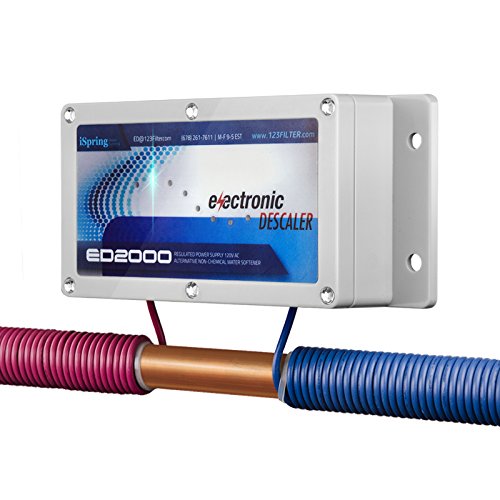If you live in an area with hard water, you’re already aware of the effects of hard water.
The buildup of limescale in your appliances and around your taps, clogging of the showerheads, and dry, itchy skin.
When you have hard water, it is hard to keep your shower and tub clean. Not to mention it can severely affect the performance of the washing machines, dishwashers, and other appliances.
Many households use water softeners to deal with this problem.
Not everybody likes to drink softened water, however.
The good news is, there are several water softener alternatives, which are a great option if you don’t want a water softener, but still want to preserve the integrity of your appliances.
What Does a Water Softener Do?
Simply put, water softeners are used for descaling hard water.
What is hard water?
Hard water contains more minerals compared to ordinary water. In most cases, water is defined as hard water when it has high amounts of magnesium and calcium.
Now, back to the question of what water softeners do, they do a fantastic job of removing minerals and metals that cause scale and all sorts of household headaches.
Specifically, the softeners remove calcium and magnesium, which are often referred to as “hardness minerals.”
At other times, however, softeners can similarly be applied to remove other minerals components such as dissolved iron.
Check It Out!
Where there’s hard water there’s usually iron too. Keep the orange stains away with these iron water filters.
A problem is that these softeners also take away the minerals that make water healthy.
They do work great at making your water soft, but that isn’t important to some people. They just want to descale the water and leave the quality alone.
Another downside is how much water gets wasted. Once the scale is isolated, that water has to be flushed and removed so it doesn’t end up in your plumbing or fixtures.
This water simply goes down the drain.
How Do Salt-Free Water Softeners Work?
Salt-free water softeners are an alternative to the salt-based softeners, and they’re increasingly becoming a popular softening alternative, thanks to their convenience and ease of use.
Salt-free softeners use the crystallization process, where the hardness minerals are converted to a hardness crystal that cannot bind to the surface. This is water conditioning, as opposed to water softening.
But how do these softeners measure up when it comes to the actual performance?
The truth is, salt-free softeners aren’t water softeners, and if anything, they don’t provide the same benefits as the salt-based systems do.
Contrary to the salt-based process, where the hardness minerals are removed from the water, the salt-free process retains the minerals in the water. Their form is changed so that the minerals do not adhere to surfaces.
Basically your pipes will not get scale build up. Unfortunately, your appliances will.

Do you Need a Water Softener?
While water is a necessity, soft water may not be. In most cases, your choice of whether to soften your water will ultimately depend on where you live, how you plan to use your water, and, finally, the cost of processing the water.
To understand whether you need a water softener, you need to weigh the benefits and drawbacks of the soft water.
Here are some of the top four reasons why you might need a water softener:
- Avoid Scale Buildup – Calcium and magnesium will attach to your appliances making them inefficient or even unworkable. Your pots and pans will also have an ashy look to them with a coating of these deposits that will eventually ruin them.
- Avoid High Utility Bills – When your appliances have scale built up on them, they work harder. You can see increases of up to 30% on your electricity bill when your appliances have too much scale built up on them.
- Avoid Clothes Fading – Your clothes will start losing their vibrant color even if you are using special detergent to maintain their color. They will also feel scratchy and not nearly as soft as they should be.
- Avoid Staining – Water softeners also remove iron from your water. If you see orange stains in your toilet, tub and sink then these stains will stop happening when you remove the iron with a softener.
Depending on where you live, a water softener might be necessary or highly advised. A water softener from Menards is a good option for those who live in an area with hard water.
Water Softener vs. Water Filtration
The main difference between filtering and softening water is that a water softener doesn’t actually filter the water.
The process simply transforms the minerals and then flushes them away. It doesn’t filter things like bacteria, arsenic or nitrates. A water filter on the other hand won’t soften your water. Some types of filters will remove the lime scale from the water but not all filters will do this.
If it turns out your water isn’t hard, but has contaminants you don’t want, then check out this detailed comparison of Aquasana vs Berkey filters for your countertop!
How Water Softeners Work
Water softeners normally use ion-exchange resins to remove the water hardness elements.
Here, the sodium-coated resins exchange the calcium and magnesium elements with the sodium ions. When the ion exchange process takes place, the water hardness elements are transferred from the water and are instead replaced by sodium ions.
A water filter does more than removing calcium from your drinking water. When water is run through a whole house water filter, for instance, it assures you of water free from harmful contaminants such as chlorine, chloramines, harmful VOCs, and more.
Contrary to the water softener that only uses ion exchange technology, water filtration employs a variety of technologies to deal with water contamination, including micro-filtration, adsorption, oxidation, and catalytic conversion.
Which is Better?
Water softeners are an incredible water purification system that will protect your household from the harmful effects of hard water, including buildup of limescale.
However, if your household is plagued by other water issues such as chlorination, sulfur staining or even bacterial contamination, a water filter should be the ideal solution.
Nonetheless, it’s not uncommon to see many of the households installed with both of the water purification systems.
Check It Out!
A water softener is not going to get rid of bacteria. Only a filter will do do that so check out this list of the best filters for coliform bacteria.
Water Softener vs. Reverse Osmosis
A reverse osmosis system is essentially a type of filtration process that works by pushing water through a semipermeable membrane to remove pollutants and contaminants from your tap water.
Like the regular filtration system, RO removes impurities from the water, including fluorides, chlorine, salt, lead, detergents, salts, pesticides, nitrates, and sulfates.
What is left after the water goes through RO is delicious tasting drinking water, free from contaminants.
Water softening, on the other hand, simply removes the hardness in water by freeing the water from calcium and magnesium.
It uses an ion exchange process to soften the water and eliminate the hard water problems such as limescale build-up.
Check It Out!
Is reverse osmosis water safe to drink? Read this detailed article for all the details.
Top 3 Water Softener Alternatives
If you have read all the information above and are not convinced that a water softener is your best bet, then check out these other systems to remove hard water.
Reverse Osmosis
Reverse Osmosis was created during WW II to bring drinking water into submarines. It basically allowed for sea water to be turned into drinking water. Reverse osmosis can remove up to 99% of the dissolved solids in the water, meaning it cleans and purifies your water for drinking.
Some of the contaminants that RO can remove include lead, fluoride and chlorine. And it is the efficiency of this purification system makes it perfect for households.
However, a downside of the RO system is that a ton of water is wasted in the process. Secondly, it’s not a speedy process. It really impacts your water pressure and flow and requires a pressure tank to make sure you have fast water from the taps.
While waste is typically a huge problem, we recommend the iSpring RO Filter because of its phenomenal waste to clean water ratio.
- 5-STAGE FILTERS: 1-3rd stages remove rust, sand, chlorine, disinfection...
- GREAT CAPACITY: Advanced 500GPD membrane saves 60% of water, with LOW WASTE...
- HIGH EFFICIENCY BOOSTER PUMP: No worries for low water pressure. Built in...
- FEATURES: Come with Sliver Chrome drinking water faucet with 360° free...
- EASY-TO-INSTALL AND REPLACE FILTER: Typically, in a couple of hours with...
Capacitive Electronic Descaler
These are every bit as effective as a water softener at removing scale from your water. It does not impact the flow rate or water pressure in any way and uses no chemicals to remove the scale.
The way they work is that there is an electric impulse that is transmitted through coils wrapped around the pipe. These impulses change the structure of the crystals of the calcium and magnesium so they lose their adhesive power. Thus, they can’t attach themselves to your pipes or appliances.
They don’t remove any of the healthy minerals in your water so the taste and quality are still there.
And they only take 15 minutes to install.
- HOW IT WORKS: Yarna CWD24 is a Patented alternative water softner for homes...
- WHO BENEFITS FROM YARNA: Our customers report cleaner pipes and faucets,...
- EASY INSTALLATION: All you need is access to a minimum of 10" of free pipe...
- WHY DESCALING IS BETTER THAN SOFTENING: The Yarna CWD24 water softener...
- 365 DAYS MONEY BACK GUARANTEE: Should you not be satisfied with the...
Template Assisted Crystallization (TAC)
This system requires no salt or electricity to soften your water. It uses ceramic-polymer beads that transform any minerals in the water to their crystal form instead of their ionic form.
Just like with the electronic system, the scale loses its adhesive qualities so it is still present in the water but won’t be able to attach to your pipes and appliances.
These are environmentally friendly and efficient.
One downside is if there is chlorine present in your water supply, it will degrade the filter medium faster requiring replacements to be purchased more often.
- Chemical-free scale reduction and protection converts hard minerals into...
- High-capacity, 20-micron water filter removes chlorine taste and odor while...
- Virtually maintenance free, no electricity, wastewater, control valve and...
- Improves efficiency of all water heating devices and downstream plumbing...
- Easily installed to the floor or wall using included mounting bracket;...
Is a Water Softener Worth it?
Since there are very effective water softener alternatives on the market, it seems that you don’t really need to use a salt based water softener.
Between the excess salt in the drinking water, the wasted water that gets flushed down the drain and the fact that healthy minerals in the water are also removed, there is little justification in using one.

Nick Lopresti is the founder of YourH2Home and a home improvement expert. He has years of experience writing about various home improvement topics, mostly as it pertains to water systems.







